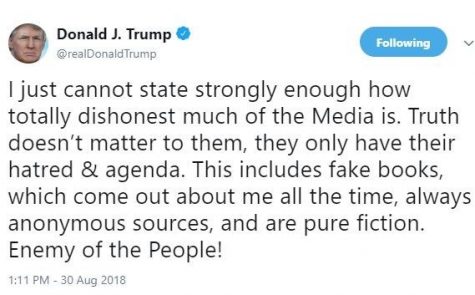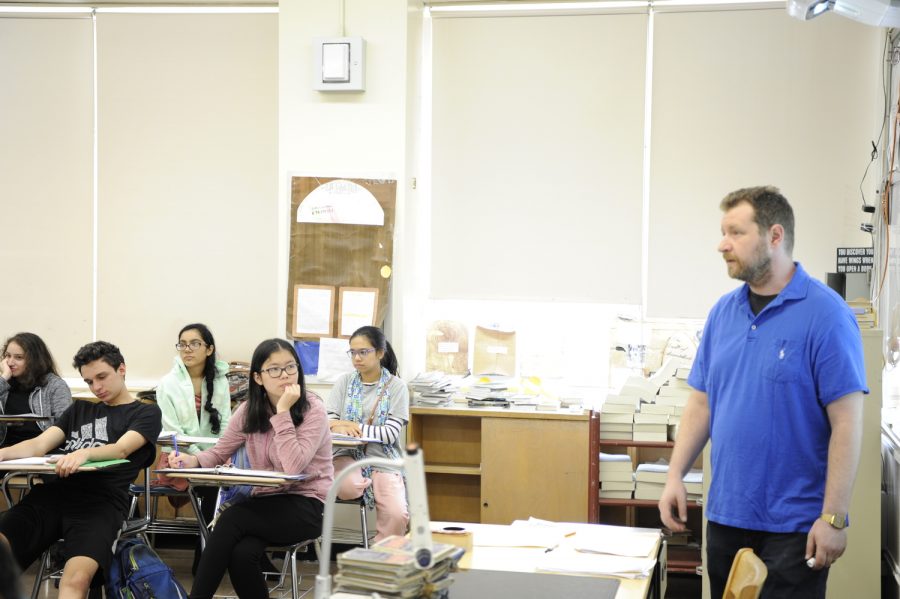In the era of “Alternative Facts,” George Orwell’s ‘1984’ Rings Truer than Ever
Mr. Grossman listens intently during a class discussion on George Orwell’s ‘1984’ in his sophomore English class.
In July of 2018, the president of the United States made a declaration to a group of veterans that would set off alarms around the country. “It’s all working out. And just remember, what you’re seeing and what you’re reading is not what’s happening,” proclaimed Trump confidently.
At its surface, the comment appeared to be another meaningless piece of rhetoric designed to attack our country’s free press. Since taking office, Trump’s denunciation of American journalism has been a constant—at first a belligerence almost too juvenile and absurd to estimate the true significance of.
However, to those who are familiar with the George Orwell’s novel, 1984, the statement bears an eerie resemblance to the ideas expressed by the totalitarian government depicted in the story.
In Orwell’s future, the nation of Oceania is governed by three slogans: “war is peace, freedom is slavery, ignorance is strength.” The Party’s censorship is absolute and systematic; simple truths and logic are consciously neglected in a government-regulated process called “doublethink.” When Winston Smith, the rebellious protagonist of the story, is forced to succumb to the lies and illogic of the party, he strikes an epiphany: “The Party told you to reject the evidence of your eyes and ears. It was their final, most essential command.” This July, when President Trump told his supporters to ignore the facts and evidence being reported to them on the news, he took a step towards this Orwellian dystopia.
“It is easy to draw a parallel between Trump’s efforts to attack the press and 1984. It’s very rattling,” said Will Olenich, ’20.
This was not the first time that President Trump has attempted to discredit our country’s press, nor was it the last. A few months after the conference, the president labeled the press an “Enemy of the People” via twitter, accusing the media of dishonestly advancing a political agenda. Since his campaign in 2016, Trump has used such rhetoric, including his famous phrase, “fake news,” as a way to reject negative press. This is exemplified in a separate tweet from May 2016 in which he declared, “91% of the Network News about me is negative (Fake).” The president is asking America to assume that unless the news we hear is in support of his administration, it is inherently false. In 1984, the Party invented also its own word—“untruth”—to describe a fact that, while empirically supported, is denounced as false because it challenges the Party’s power. The similarity between these two behaviors does not go unnoticed: “It is easy to draw a parallel between Trump’s efforts to attack the press and 1984. It’s very rattling,” said Will Olenich, ’20.

Trump’s August 2018 tweet.
Throughout his presidency, Donald Trump has not only attempted to discredit the truth, but has also spread false or misleading claims in an attempt to romanticize the state of our country under his administration. ‘The Washington Post’ has estimated that, less than two years into his term, he has disseminated 5,001 false or misleading claims to the American people. For example, in June 2018, Trump bragged to supporters at a rally that the U.S. Steel Company had recently made plans to construct six new mills. In a statement released by the president of U.S. Steel, it was made clear that there are no such plans. This absurd boasting of false successes is a behavior paralleled, once again, by the propaganda of 1984’s Oceania.
Trump’s untrue claims are enabled, promoted, and frantically defended by members of his administration. In January, Kellyanne Conway, one of Trump’s closest advisors, went so far as to coin the term “alternative facts” in an effort to dress up blatant lies as subjective truths. What alternative facts really are, though, are America’s version of 1984’s “doublethink.”
Mr. Grossman, a Bronx Science English teacher who first began discussing Orwell’s 1984 in class six years ago, is no stranger to the universality of Orwell’s political commentary. When asked about the connection between the novel and the politics of today, Mr. Grossman pointed to a passage which he believes “contains some of Orwell’s most universal social commentary. One thought from this excerpt stood out, ‘If one is to rule, and to continue ruling, one must be able to dislocate the sense of reality.'”
Perhaps President Donald Trump’s intentions are not this sinister. Regardless, we must acknowledge the fact that the artifice present in our current government is unprecedented in the history of our democracy. We must also be warned by the many similarities between Orwell’s dystopia and our current reality. After all, despite these commonalities, there is one tragic difference between the anti-truth barrage of 1984 and that of the Trump administration: only one of the two is a work of fiction.
Cameron Leo is an Editor-in-Chief of ‘The Science Survey’ and a Student Life Reporter for ‘The Observatory.’ Cameron has always loved to write,...
Jackson Trauben is a Photo Editor and Chief Photographer for ‘The Observatory.’ An avid reader and artist, Jackson loves using photography as a lens...

